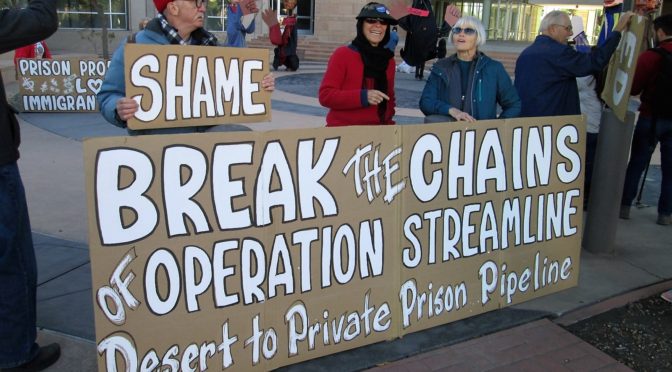It goes on. Operation Streamline is criminalization of migrants as a means to deter re-entry to the United States. Shackled migrants, as many as 75 a day, are rushed through federal court in Tucson, Arizona. The process sometimes happens in less than 30 minutes. After meeting with a government-contracted attorney, they are called to the bench seven to nine at a time. Migrants leave as criminals and are sent to a government-contracted private prison run with billions of taxpayer dollars.
I have witnessed court proceedings since June 2015, heard stories and interacted with families.
Observers now must sit on the far right side of the courtroom, where it is more difficult to see and hear the proceedings. The US Marshals will not give a reason. Migrants can no longer see us as they are escorted from the room.
The most cited reason for re-entry is family reunification. Others are seeking asylum and should be treated as refugees, not criminals.
I was part of a community group that recently toured the Border Patrol Tucson Sector facility. When we asked several times why migrants who expressed fear were sent to Streamline, the reply was that they had committed a crime. They were criminals.
Senators McCain and Flake declare Streamline “a success.” But the Department of Homeland Security’s own inspector general issued an audit in May 2015 stating that Streamline is not effective in deterring migration and noted it may be violating international treaties by prosecuting asylum seekers.
There are changes in the courtroom, not necessarily for the better. There’s a new magistrate and some new attorneys. And the silence is palpable. No longer do we hear statements from migrants or their attorneys about fear, requests for asylum, and other concerns. Why? Observers are looking for answers.
Another change is that observers now must sit on the far right side of the courtroom, where it is more difficult to see and hear the proceedings. The US Marshals will not give a reason. Migrants can no longer see us as they are escorted from the room.
Mondays are still at capacity with 75 migrants. Numbers drop the rest of the week. This is a change.
According to Border Patrol statistics, apprehensions have decreased 90 percent since 2000. But more of those apprehended are criminalized.
Observers are needed on a regular basis. To volunteer or inquire about meeting times, contact Leslie by email. For further information, the Derechos Humanos website has a section on the ESC.
The End Streamline Coalition (ESC) continues its work to end Streamline and all criminalization of migrants. In December 2015, the ESC commemorated 10 years of Streamline with a march through downtown Tucson, street theater with big puppets from Borderlands Theater, and a weeklong vigil and information table outside the federal court building.
Local clergy organized their own action and spoke eloquently in the courtroom.
ESC members have met with Chief Judge Raner Collins, US Attorney John Leonardo, and the Border Patrol. Volunteers, including members of No More Deaths, continue to observe in court.
It goes on and must be stopped.
Text: Laura Martinez. Featured photo: Paige Winslett.

